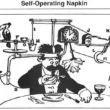Let’s pick up “The Story of Deep Capture” where it left off – with the demise of Bear Stearns and the near collapse of the American financial system.
It’s April 2, 2008, and CNBC reporter Charlie Gasparino has just reported that Lehman Brothers CEO Richard Fuld claims to have evidence that short-sellers, who profit from falling stock prices, actively colluded to bring down Bear Stearns.
Indeed, the SEC is already investigating precisely this possibility. The regulator has said that it would like to know whether short-sellers circulated false rumors about Bear Stearns’ liquidity and credit risk in order to spark a run on the bank. And it has announced that it is investigating allegations that hedge funds engaged in “naked short selling” to drive down Bear Stearns’ stock. This isn’t surprising considering that SEC numbers show, for example, that in the week of Bear Stearns’ destruction, up to 13 million of its shares were shorted naked – ie. sold and not yet delivered. That’s 13 million shares of phantom stock — and most experts assume there was much more of it, perhaps 100 millions fake shares, in parts of the system that the SEC doesn’t monitor.
Live on CNBC with Gasparino is reporter Herb Greenberg. Herb is a dishonest journalist. He has quite literally made a career out of taking dictation from a small group of closely affiliated short-selling hedge funds. Virtually every story he has ever written or broadcast has come from these people. He protects his hedge fund friends by repeatedly denying that phantom stock is a problem. And a former employee of a financial research shop called Gradient Analytics claims to have witnessed Herb conspiring with at least one short-seller, David Rocker, to hold his negative stories until Rocker could establish short positions. This is called front-running — a jailable offense.
CNBC is not concerned about this. Nor is it concerned that, in addition to his duties as a “journalist,” Herb is now also running his own financial research shop that caters to short-sellers. Yes, after years of denying that he has too-cozy relationships with short-sellers, Herb is now seeking to profit from those very relationships. His new company’s slogan is “bridging financial journalism and forensic analysis.” Anybody who believes that media and money don’t mix should be appalled.
Anyway, it is unsurprising that Herb is live on CNBC reporting that short-sellers had nothing to do with the demise of Bear Stearns. Instead, Herb says, Bear Stearns was taken down by a “crisis of confidence.” Could short-sellers have caused the “crisis of confidence?” Herb thinks not.
Herb says, “….if you take a look at [fellow CNBC reporter] David Faber’s reporting which was very interesting…”
* * * * * * * *
Good idea, Herb. Let us take a look at David Faber’s reporting. It was not just interesting. It was jaw-dropping – an utterly grotesque display of journalistic malfeasance.
Indeed, Faber’s reporting probably contributed a great deal to the precipitous collapse of Bear Stearns – an event so potentially calamitous that the Federal Reserve had to meddle in the investment banking sector for the first time since the great stock market crash of 1929.
On Tuesday, March 11, rumors were circulating around Wall Street that Bear Stearns was out of cash and that other banks were no longer accepting its credit risk. If anybody were to think these rumors were true, there would be panic – a run on the bank. If the rumors were false, as they quite demonstrably were, it was the job of the media to quash them.
CNBC’s Charlie Gasparino did his job. On that afternoon, he noted that there were “serious doubts” about Bear Stearns business model. He said that Bear Stearns was a “mediocre bank.” But he also noted that the rumors on Wall Street were suggesting something far worse –imminent bankruptcy–and that there was not a scrap of evidence suggesting that these rumors were true.
Gasparino quoted Bear Stearns CFO Sam Malinaro as saying “Why is this happening? I don’t know how to characterize it. If I knew why this was happening I would do something to address it. I spent all day trying to track down the sources of the rumors, but they are false. There is no liquidity crisis, no margin calls. It’s all nonsense.”
Gasparino stressed that there was no reason to doubt Bear Stearns’ claims. “I know Sam Malinaro pretty well,” he said. “He’s one of the best straight shooters in the markets.”
If Gasparino had stayed on the case, the uncertainty surrounding Bear Stearns’ liquidity and credit risk might have subsided, and the bank might have survived. But the next day, for some reason, Gasparino was taken off the Bear Stearns story, and David Faber took over.
A few rumors – even doctored memos falsely claiming that big banks had refused to accept Bear’s credit — were still circulating around Wall Street. Early that morning — Wednesday, March 12 — Faber interviewed Bear Stearns’ CEO, Alan Schwartz.
Actually, it was more like a prison interrogation than an interview. Faber demanded that Schwartz explain the rumors. Schwartz said the rumors were not true. Quite in contrast to Gasparino, Faber made it clear from his tone that viewers shouldn’t trust Bear’s executives.
Then Faber delivered this whopper: “…I’m told by a hedge fund that I know well…I’m told that [last night] Goldman would not accept the counterparty risk of Bear Stearns.”
Bang! The beginning of the end.
Understand how important this is. Previously, most people assumed that the rumors about Bear’s access to leverage were nothing more than…rumors. No reporter had suggested otherwise.
Now, for the first time – live on CNBC, in the middle of a mission-critical interview with Bear’s CEO — a prominent journalist was reporting that the rumors were true. He stated — as if it were fact — that Goldman Sachs, one of the biggest investment banks in the world, had refused to take Bear Stearns’ credit.
Faber was generous enough to note that this information came from a hedge fund “friend,” and it wouldn’t take a genius to see that this hedge fund “friend” was probably some skeezy short-seller of Bear Stearns’ stock – but still, Faber’s comment was nuclear explosive.
Soon after Faber’s comment, Schwartz is about to provide details proving that Bear Stearns is not at all illiquid – that it has ample cash (and is therefore hardly a credit risk). He says: “…none of the speculations are true, but….”
Just then, a woman’s voice interrupts: “I’m sorry! I’m sorry!”
What? Can this possibly be happening? The CEO of a giant investment bank is about to provide evidence that the bank is not insolvent – that the American financial system is therefore not on the brink of collapse. This is perhaps the most important financial news moment of the past ten years, and now CNBC has cut off the CEO in mid-sentence!
“I’m sorry,” the CNBC woman says. “David, I’m sorry breaking news, I just want you to know that we have New York state officials confirming that New York governor Elliot Spitzer will resign today. Formal resignation, we don’t have it, but it is now confirmed that the governor of New York will resign today.”
“Thanks for that not unexpected news,” says David Faber.
This was probably straight-forward idiocy – nothing more sinister than that. But you’d think CNBC could have waited a few minutes for this “not unexpected” news. And anybody with a healthy sense of irony might chuckle and point out that Jim Cramer, the former hedge fund manager who is now CNBC’s top-rated personality and basically runs the place, was Elliot Spitzer’s best friend and college roommate. The irony is all the richer when you consider that Elliot Spitzer’s career was built almost entirely on the funding and machinations of a small group of short selling hedge fund managers – including Dan Loeb, David Einhorn, and Jim Chanos (owner of the beach house where Spitzer’s favorite hooker lived rent free), and that these very same hedge fund managers are the ones who are quite aggressively attacking Bear Stearns.
Schwartz looked mighty pissed off. After the interruption, he tried to continue: “We put out a statement that our liquidity and balance sheet are strong. Maybe I should expand on that a little bit…”
“Well, yeah,” Faber interrupts. “Why don’t you.”
The reporter’s tone again suggests that the CEO is not to be trusted. Tone aside, Faber doesn’t let Schwartz answer. Instead, he launches into a long and completely irrelevant monologue about the markets generally being in bad shape.
“Well, the markets have certainly gotten worse,” says Schwartz, clearly baffled by all of this.
Then, finally, the CEO manages to provide the salient information – the information that Bear Stearns customers and traders around the world have been waiting to hear. He says, “Our balance sheet has not changed at all. So let me just talk about that for a second….When we finished the year we reported that we had $17 billion of cash sitting at the parent company as a liquidity cushion…Since year end, that liquidity cushion has virtually been unchanged. So we still have many many billions of excess cash…we don’t see any pressure on our liquidity let alone a liquidity crisis.”
That certainly should have calmed the waters. There was no evidence that Schwartz was being disingenuous about having that $17 billion. Bear Stearns might have been the crappiest bank on Wall Street, but as long as customers knew that Bear Stearns had that $17 billion in cash, there was unlikely to be a run on the bank.
Unless, that is, a “reputable” media source was to suggest that, say, Goldman Sachs, had cut off credit.
Astonishingly, in the ensuing 24 hours, CNBC never once repeats the news that Bear Stearns has $17 billion in cash. And though it repeatedly references the interview with Schwartz, the network does not once replay the CEO’s strongest comment: “We don’t see any pressure on our liquidity, let alone a liquidity crisis.”
But Faber does repeat the startling “news” about Goldman.
At 8:48 AM on Wednesday, he says, “There are a lot of concerns out there…about counterparty risk. Frankly, I’ve been hearing from people whom I trust that there are some firms out there unwilling to put on new – new — counterparty risk with Bear Stearns…You had it at Goldman…Goldman said no we’re not taking Bear’s counterparty risk – this was yesterday.”
The hedge fund manager whom Faber “trusts” was lying. Goldman was not turning down Bear’s credit. We know this because some minutes later in the broadcast, Faber says so. He says it very quickly, just as an aside, as if it doesn’t matter at all. He says, by the way, “I have heard that that trade did actually go through—Goldman did say alright, now we will accept Bear as a counterparty.”
So Faber has just admitted, in an off-handed kind of way, that he was lied to by the hedge fund he “trusts.” In other words, up until this point, there is no evidence at all that rumors being circulated by hedge funds have any merit whatsoever.
Despite this, Faber proceeds to unleash this gobbledygook: “At the end of the day, while they say over and over they have plenty of liquidity, and in fact they may, it all comes down to confidence. They need to have access to capital, access to leverage. Otherwise, they’re dead! And it can happen very quickly.”
With this, Faber looks at his computer, and says, “Let’s see where the stock is.” Then he declares with glee: “Oops! It’s down!”
So now Faber has just pronounced that Bear Stearns might be “dead!” Why might Bear Stearns be “dead?” Because, Faber says, Bear needs “access to capital” – this in the same sentence where he says “in fact they may” have plenty of liquidity (ie. access to capital). Perhaps by “may” he meant to suggest that Bear “may not” have access to capital. Either way, he carefully omits the fact that the bank has told him it has $17 billion in cash.
The other reason Bear is “dead” is because it needs “access to leverage.” Is there any evidence that it does not have access to leverage? So far, there is none other than the Goldman news, which Faber has just admitted to be a complete fabrication delivered to him by a hedge fund “friend” whom he “trusts.”
Meanwhile, in an effort to send Bear Stearns’ share price spiraling downward, hedge funds are selling tens of millions of dollars worth of phantom stock. SEC data shows that more than 1.2 million shares sold that Wednesday were not delivered on time.
It only gets worse. The next morning — Thursday, March 13 — there is still no evidence that anybody is turning away Bear’s credit or pulling out money. CNBC still has yet to repeat the all important $17 billion figure. And now, Faber is back on television, fanning the flames, and repeating the bogus Goldman news.
He says, “I talked [yesterday] about a particular trade I was aware of where Goldman Sachs did not want to stand up as a counterparty and face Bear on new counterparty risk.”
Yes, David, you did talk about Goldman – and you admitted that your information was false. Why are you repeating this?
In a stuttering attempt to explain himself, Faber says to his television audience, “Now ultimately that trade did take place [ie. Goldman did accept Bear’s credit] after my interview with Mr. Schwartz concluded, but the day prior, Goldman did not want to. I have incontrovertible proof of that.”
Right. Whatever. The SEC should subpoena Faber to find out which market-manipulating hedge fund fed him the false information about Goldman.
Of course, if the SEC were to do this, the Media Mob would go berserk and start waving the First Amendment right to protect hedge funds who take down public companies by feeding journalists false information. Remember that the SEC once tried to subpoena Herb Greenberg and Jim Cramer, only to back down after Cramer vandalized his government subpoena live on CNBC and a bunch of Herb and Cramer’s media pals rose up in their defense.
But enough of this, already. These journalists are not protecting whistleblowers or freedom of speech. These journalists cannot even properly be called “journalists.” They are, or at least aspire to be, market players. They are helping slippery hedge fund managers who are destroying public companies for profit, and putting the American financial system at risk. I’m all for real reporters standing up to federal agencies, but these “journalists” are special cases. The SEC should not allow itself to be intimidated by them.
Alas, it’s too late for Bear Stearns. On the morning of March 13, there was still no evidence that anybody had pulled money out of Bear Stearns or denied its credit, but after repeating the Goldman falsehood, Faber reported: “I remember when Drexel Burnham went down [the smarmy inference being that Bear Stearns is a crooked company similar to Drexel]…It happens fast, very fast. It happens because those who do business with a firm such as that [read: `a crooked firm’] lose confidence.”
“And when they lose confidence,” Faber continued, “they pull their lines, and that’s it. It’s done. Pack your bags. Go home. It can end in an hour.”
About an hour later, a hedge fund called Renaissance Technologies Corp., shifted $5 billion out of Bear Stearns. That was the first client to “pull its lines.” Many others followed suit.
With Faber blowing taps, panic ensued.
And by that evening, Bear was, indeed, “dead.”




that whole crew on cnbc are acting like they’ve found a cure for cancer. A bunch of pompous smarmy cue card readers who have far to much say and power these broadcasts are reckless and should all be investgated. These aren’t journalists. There is nothing fair or balanced about anything they do!!!!!! Phooey!
Rick Aristottle Munariz of the Motley Fools is paid to mislead investors about Sirius XM Radio. He is part of a news media collusion lead by CNBC and their own Jim Cramer. Jim Cramer’s street.com web site is also hip deep into the collusion. Jim Cramer and his writers, especially Scott Moritz are all part of the scandal and it leads upward to CNBC/GE executives and Goldman Sachs. Thank god their is now an investigation taking place with Goldman Sachs. Goldman Sachs was investigated and 10 firms, including Goldman Sachs were fined $1.4 Billion dollars in 2003. Now the full blown investigation by Boston’s Chief Financial Regulator William Galvin will reveal the corruption of Goldman Sachs again and I can only hope that William Galvin will follow the money trail and check the bank accounts of Rick Aristottle Munariz of the Motley Fools along with Scott Moritz of the Street.com Just check these 2 writers banking accounts and the investigation will reveal that they are being paid off to write mis-leading stories about Sirius XM Radio. The money trail from these 2 writers will lead to >>> Motley Fools >>> Street.com >>> Jim Cramer >>> CNBC >>> GE / CNBC executives >>> NAB >>> Goldman Sachs.
It has all been a news media collusion along with the combination of Wall Street corruption by Goldman Sachs to destroy Sirius XM Radio inc. by naked short selling, flash trading, superfast computers, using secret software to manipulate the Sirius XM Stock price in decimal places the past few years since the Siri /XM merger was announce in Jan 2007. It was a pact agreed to by the news media and Goldman Sachs, which is why CNBC keeps reporting positive story after positive story about Goldman Sachs. All are into this collusion knee deep and this is why they will not report Goldman Sachs and their biggest scandal in the history of Wall Street.
Goldman Sachs got greedy. The scandal with Sirius XM Radio, worked so well with their secret software that was making them millions of dollars a day. Well, their Greed expanded into not just naked shorting & decimal place trading Sirius XM radio, but Goldman Sachs, next said , heck this secret software works so well, along with CNBC’s cover up lets do it to our competition the banking industry. Goldman Sachs next used these tactics on the banking industry in 2008 – 2009. They have been protected by CNBC by paying CNBC millions of dollars a month in advertising or shall we say paid protection.
Goldman Sachs greed almost ruined this country when they began using naked shorting and their secret software to attack the banks. It was their Greed of making millions using this software attacking Sirius XM Radio and when they expanded their scandal to the banking industry, they were now making over $100 million dollars a day. This is a fact, as Goldman Sachs made over $100 million dollars a day in 46 of 64 trading days last Quarter 2009 ( April , May, June 2009 ).
CNBC is part of the scandal, taking in million a months from Goldman Sachs for their silence. Why wouldn’t Goldman Sachs pay CNBC millions of month, that was nothing to them, since they are making over $100 million dollars a day. They helped CNBC try to ruin the competition ( Siri ) and now CNBC will help them ruin the other Banks. A true partnership by Goldman Sachs & CNBC.
The scandal lives on today, but thankfully the investigation by William Galvin will be expanded into the news media collusion of CNBC, Motley Fools & Street.com along with many other news media types.
Their Greed and goals have cost the average investors of the World hundreds of billions of dollars the past few years. In the end the truth is going to come out, but how does the people of the World hear the truth when the news media is part of the Scandal.
Well, a few years ago, CNBC & Goldman Sachs would have gotten away with it, but thank you http://www.Satwaves.com , http://www.twitter.com/stockshockmovie and the many social media outlets and bloggers out there. Thank you for helping bring the truth to the World. Each day we get closer and closer to the biggest scandal in the history of the United States. ( Written by Richard Keane – August 30th, 2009 )
Check out this link.
I was contacted by the White House a few weeks ago.
http://www.24-7pressrelease.com/press-release/white-house-curious-about-movie-stock-shock-114735.php
Richard Keane, narrator Stock Shock
http://www.twitter.com/stockshockmovie
Does any other man in the world look that hot in a suit?
This is very great post i will link this post to my blog, keep posting!